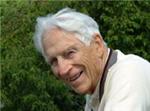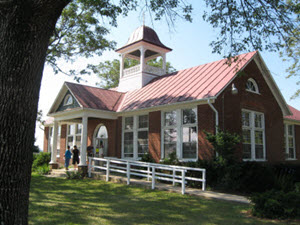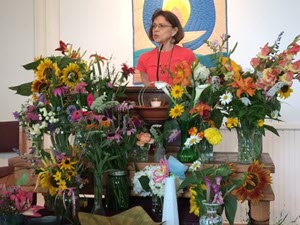
HUU Sermon Archives
Looking Backward
By James J. Geary
November 10, 2002
 I
scheduled this talk several months ago. So during a recent extended trip that my
wife, Pat, and I took, I thought a lot about what I could say to you that might
be interesting. I concluded, since with a few exceptions you are all 20 to 40 years
or more my junior, that I'd talk a little about what it's like to be quite old —
at least for me.?
I
scheduled this talk several months ago. So during a recent extended trip that my
wife, Pat, and I took, I thought a lot about what I could say to you that might
be interesting. I concluded, since with a few exceptions you are all 20 to 40 years
or more my junior, that I'd talk a little about what it's like to be quite old —
at least for me.?
Frankly, except for some loss of energy, a few aches and pains, and frustration over a weakening memory, life is not that much different from what it was 20 or 40 years ago. I heard a story some time back that might be apropos. I don't know whether it's true or not. The Supreme Court justices were coming out of their building to go to lunch. Just then this pretty and shapely young woman came tripping by. And one of the older justices turned to his colleagues and said: "Oh to be seventy again."
Well, I thought I'd reminisce a little about how the world has changed during my long life. I'd talk a little of what I've learned, if anything, about our world. I'd discuss how luck has guided my life. And finally, I would give my view of the final exit.
So what is spiritual about all that? Well, if spirituality is trying to understand the world and one's place in it, then my whole adult life - since about age thirteen - has been a spiritual quest. I guess I just have that kind of a mind- always questioning. I certainly don't claim to have a super brain. I can't remember where I left my glasses. And remembering names and words is not my long suit.
But, I do believe, I have good spatial capacity. I have always been able to step aside, so to speak, and see things objectively; to see the big picture, to see the forest as well as the trees. Thus, I have always felt, I could come closer than many to understanding the overall scheme of things. Maybe we all feel that way.
I want to be careful I am not bragging about how old I am. You are all kind enough to tell me I don't look my age. And of course that's a satisfaction to me, a point of pride- pride, one of the deadly sins. And it really is. I need to be careful.
So when I tell some acquaintance or some stranger how old I am in order to get his or her reaction of disbelief, I have to remember a quote from Emerson in his essay on compensation. No man, he wrote, "had ever a point of pride that was not injurious to him." I am sure that is true.
And I plead guilty in a related matter. Pat pulls me up short when I revert to being a namedropper, mentioning this or that prominent person that I have known or shaken hands with. She asks if she can touch me. And rightly so. It is so silly and shallow of us to think it makes us important to have some remote connection to an important person or an important event. For instance, most of us have a tendency to brag about "our" football team, or "our" native state; to speak of the politician or movie star we've ridden in an elevator with. Childishness!.
Well, to reminisce a little. I remember riding, as a child, in a touring car with several adults. Hoards of people were celebrating in the streets. Someone in our car was ringing a cow bell. The occasion was the celebration for the World War I Armistice, November 11, 1918, 84 years ago tomorrow. I was four.
So I grew up during the 20s. I was an adult during the Great Depression, and I struggled during the 40s and 50s to pay the bills and help raise a quartet of daughters. I wish I had the words to really describe how the world and our country have changed since that 1918 celebration, or even from those 40s and 50s. The trouble is, it is a hard picture for me to grasp; it is so complex.
Almost every aspect of American life has gone through a revolution.. Take one thing, the automobile. I was driving my uncle's car when I was 13. Cars then weren't bad, but they were a far cry from today's magnificent machines. To my mind, the automobile is the most perfected machine in our society. I am astounded at the complexity, the reliability, the safety and the convenience of the modern automobile. And they take such dire punishment.
But the automobile , of course, is but one example. Many of the things we take for granted today were not dreamed of a few decades ago- air conditioning, the jet airplane, television, Interstate highways, frozen foods- not to mention that astounding revolution that was brought about by the pill- to mention some others, high-powered drugs, computers, digital cameras, compact discs, and hundreds of other items. There have been far greater advances in science and technology in my lifetime, and probably in yours, than in all the rest of recorded history.
Has it made for a better world? I don't think so. But I am not going to get into that.
What have I learned in all these years? Perhaps not much. I do resonate with the Italian immigrant in New York whom Alistair Cooke talked with. He asked him what he had learned in forty years as a street vendor. And the street vendor replied: "There is no free lunch." I believe that.
I want to talk about luck. As many of your know, I am a determinist, a sort of fatalist in my view of life. I'm not trying to proselytize. Being a determinist has nothing to do with every day behavior. But how could I help but be a determinist? Luck has played such a paramount role in my life. To begin with, I was lucky to have chosen the right grandparents, and especially my wonderful parents.
Maybe it was good luck that my life has been more or less dominated by females. It began with my mother and a passel of aunts. I was the oldest grandchild on both sides of my family, and so I had a number of aunts who doted on me, both in Virginia and Pittsburgh.
I hear people talk of unhappy childhoods. I think mine was a happy childhood. Despite the breakup of my family when I was four, I had lots of people, mostly women, who loved me. I was not without a couple of father figures, including my father, with whom I spent my childhood summers in Pittsburgh. I loved him very much.
But then there has also been the consuming matter of three wives and five daughters. So you see what I mean. And as for good luck, I am everlastingly grateful to the fate that brought Pat and me together. The past 20 years have been the most happy and peaceful years of my life.
I would like to say, to digress a moment, that I have great respect for women, and for females in general. It seems to me, that on average, women are tougher than men when the chips are down, more enduring, more likely to have their feet on the ground. Most women who are single parents are single-minded about raising their kids; they keep trying regardless of how deprived they are.
And biologists will tell you that it's true throughout much of the biological world that females are tougher, have greater survival qualities, than males. Males, more high strung, with higher metabolism rates, wear themselves out competing, fighting, and with general thrashing about. I'm sorry fellows, but that's the way it is.
Everything, it seems to me, is luck. It was a chance conversation with a virtual stranger, another officer at Naval indoctrination school in Chicago that radically changed my Naval career in World War II. It took me out of an amphibious assignment, in which I spent a month in San Diego learning to beach and back off landing craft, into a special flight training program in Indiana. And when, after six months and accumulating 150 hours of flying time, I washed out of that, it took me to a sort of Shangri-La in Northern Idaho. It was a huge Naval training station on the shore of a beautiful 40_mile lake smack in the center of the Rocky Mountains. I was there for more than two years, my family with me, including two delightful baby daughters. How can I not be a determinist?.
It was also an unlikely chance conversation that changed my professional career in midstream. I went, at age 44, from being a newspaperman to two highly creative jobs of interpreting the Civil War, of building museums, and of creating and managing a battlefield park. In those jobs I was the boss, and that's a nice thing to be. How could I not be a determinist?
One of the things you think about a lot when you get quite old is the end of life. You try to image the world after you are gone. In my case, I know I will not be looking down from some heaven to see how things are going. Nor will I be looking up from that other mythical place. I will not be looking anywhere, because I simply will not be. I don't believe in an afterlife. To me the idea of an afterlife is incompatible with the nature of reproduction- the joining of cells from male and female to form a unique pattern.. We had no individual life before that joining, and we will have no individual life after that pattern ceases to function.
So I don't believe in an afterlife. And for that reason I have no fear of death- none, zero, zilch. Life is a vast stream. For the individual, the stream of life comes to an end. If he or she has children, then his or her contribution to the endless stream of life goes on. I consider that I have been half of a channel through which my children have carried the stream of life from the vast unknown past to the vast unknown future. But for the individual, death is the end of everything. No more joy, no more frustration, no more sorrow, nothing... nothing... nothing.
But nothing is hard to imagine. Have you ever tried to conjure up a world where you don't exist. I keep trying to imagine the world after I am gone. I will not know anything about it. I will not be curious about how my children or grandchildren are doing. I won't be curious about anything, because I won't be. The great, unimaginably complex organ we call the brain will have ceased to function as an organized entity. This unique living pattern that is I, that came into being from my mother and father, will have dissolved. Nothing of this complex organization, this going concern, will remain except the dying cells, deprived of their sustaining oxygen.
That is not to say, however, that we don't, every one of us, leave our mark on the world. Some leave more of a mark that others. Jesus certainly left his mark, as did the Buddha, and Mohammad, and other religious leaders. But then so did Alexander the Great, Caesar, Napoleon; also Hitler and Stalin, and other conquerors and would-be conquerors.
Yours and my contributions are more modest. But what difference does that make. None of those religious or military giants knew anything after their lives ceased. They could feel no satisfaction- or horror- over what they left behind.
Life is a gift. We don't know from whom or what, or for what purpose, or if there is a purpose, that we were given this short stay on earth, this brief period of consciousness. We had nothing to do with it. We have to accept it and cope in the world with whatever talents we were given, and in whatever circumstances we find ourselves.
I think life is good. In my first talk to this group, nearly thirteen years ago, I suggested that if I were in an airplane 30,000 feet above the earth that was hopelessly crippled and diving to certain destruction, that I would face death calmly. I said: "I would be thankful that I had been a conscious part- for a little while- of this great mysterious universe. I would feel that I as an individual would be no more, but that everything that I had been and done would go on forever as a continuing influence in the Universe, just as a dying star is for ever a continuing influence in the Universe."
I hope those would be my thoughts.
Read more sermons or talks by Jim Geary.
For the latest sermons and events at HUU, visit our Community Cafe.
Inclement
Weather Policy
Worship
Service Materials


UUs on YouTube
Our denomination has an official presence on YouTube! The Unitarian Universalist Association's YouTube site includes several videos and lots of interesting commentary.
Harrisonburg Unitarian Universalists 4101 Rawley Pike | Harrisonburg,
VA 22801
Mailing Address: | PO Box 96 | Harrisonburg, VA 22803
| (540) 867-0073 | Webmaster
HUU is a member of the Southern
Region of the Unitarian Universalist
Association
Privacy Policy &
Disclaimer
Site Design & Maintainence : Expression
Web Tutorials & Templates


